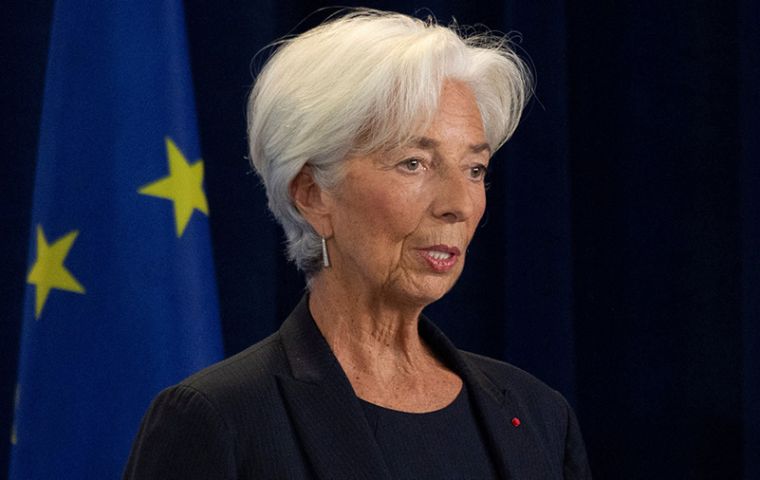MercoPress. South Atlantic News Agency
New ECB chief calls on budget surplus countries to spend more and help prop growth
 Lagarde argued that “countries with chronic budget surpluses like Holland and Germany”, needed to loosen their purse strings to redress the “imbalances” in bloc
Lagarde argued that “countries with chronic budget surpluses like Holland and Germany”, needed to loosen their purse strings to redress the “imbalances” in bloc Incoming European Central Bank chief Christine Lagarde on Wednesday took aim at Germany and other thrifty Eurozone members running budgetary surpluses, saying they should increase their spending to shore up slowing growth.
Lagarde told France's RTL radio that whereas euro zone members had successfully coordinated their fiscal policies to save the bloc during the 2008-2009 sovereign debt crisis, “since then the countries which have budgetary space have not really made the necessary efforts.”
She argued that “countries with chronic budget surpluses like the Netherlands and Germany”, needed to loosen their purse strings to redress the “imbalances” in bloc, by investing more in infrastructure, education and innovation.
The comments are a possible indication of the assertive stance that France's Lagarde, a hugely respected figure who was IMF chief from 2011-2019 but has no previous central banking experience, plans to take in the key job.
For the past five years, Germany, Europe's biggest economy, has consistently posted budget surpluses, testament to the strict fiscal discipline of Chancellor Angela Merkel's government.
But with forecasts pointing to the country entering a recession in the third quarter, the government is facing increasing calls to spend more on investments or approve tax cuts to support the economy.
Germany's large budget and trade surpluses has for years been a bone of contention between Berlin and Paris, with France regularly calling on Germany to invest more of its spare cash.
“What's the point of having public accounts perfectly in order ... if your European neighbors can't benefit from your growth and economic dynamism?,” French Finance Minister Bruno Le Maire argued last month.
The International Monetary Fund (IMF) under Lagarde regularly prodded Germany to reduce its budget surplus to boost growth and wages.
So far German officials have rebuffed calls for fiscal stimulus, saying the government is already spending heavily.
Lagarde, who will take over from outgoing ECB head Mario Draghi on Friday, pressed the case for greater solidarity among the 19 countries that share the euro.




Top Comments
Disclaimer & comment rulesCommenting for this story is now closed.
If you have a Facebook account, become a fan and comment on our Facebook Page!